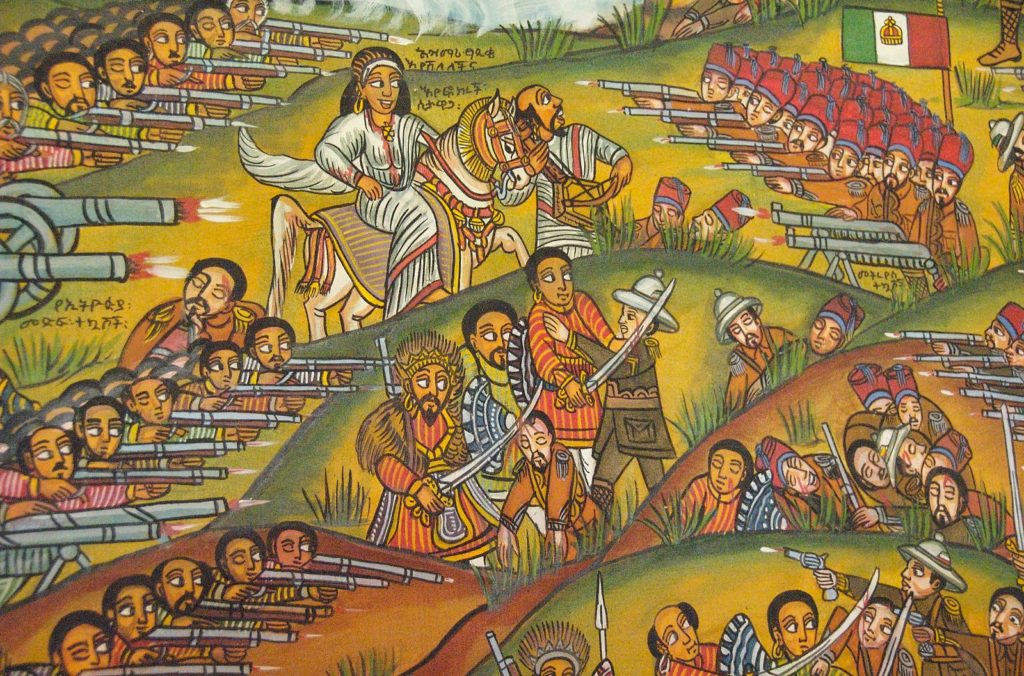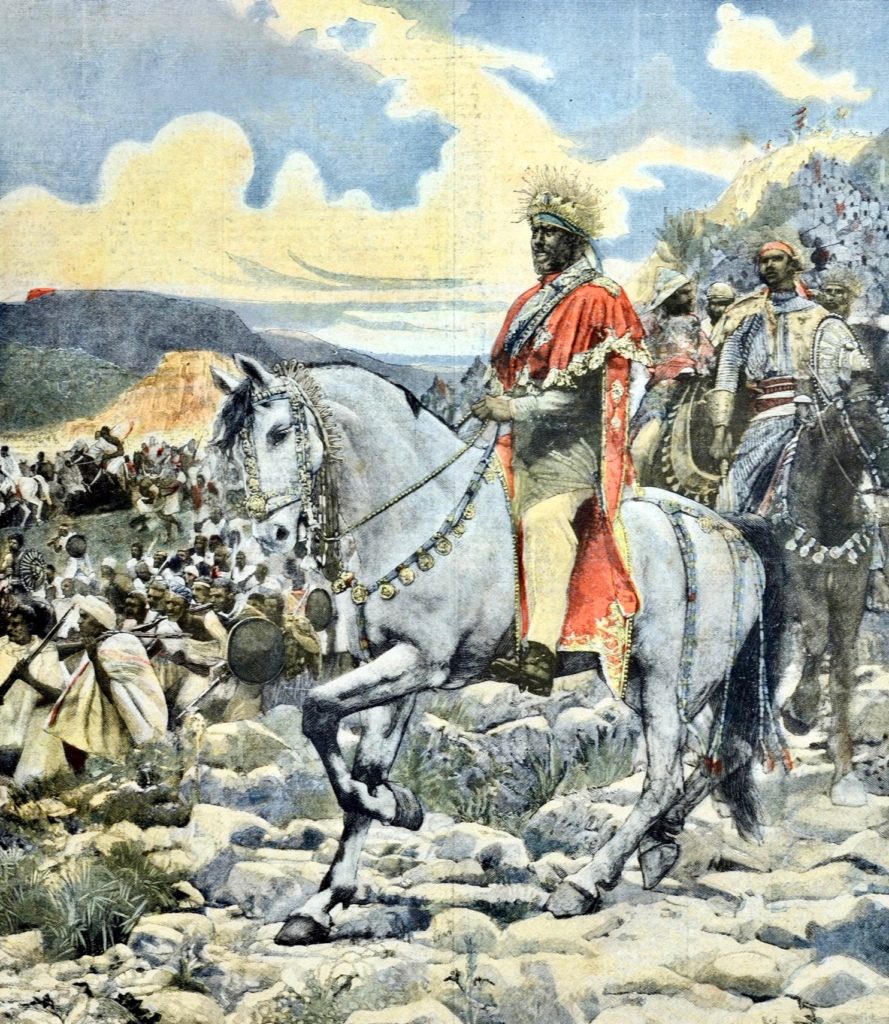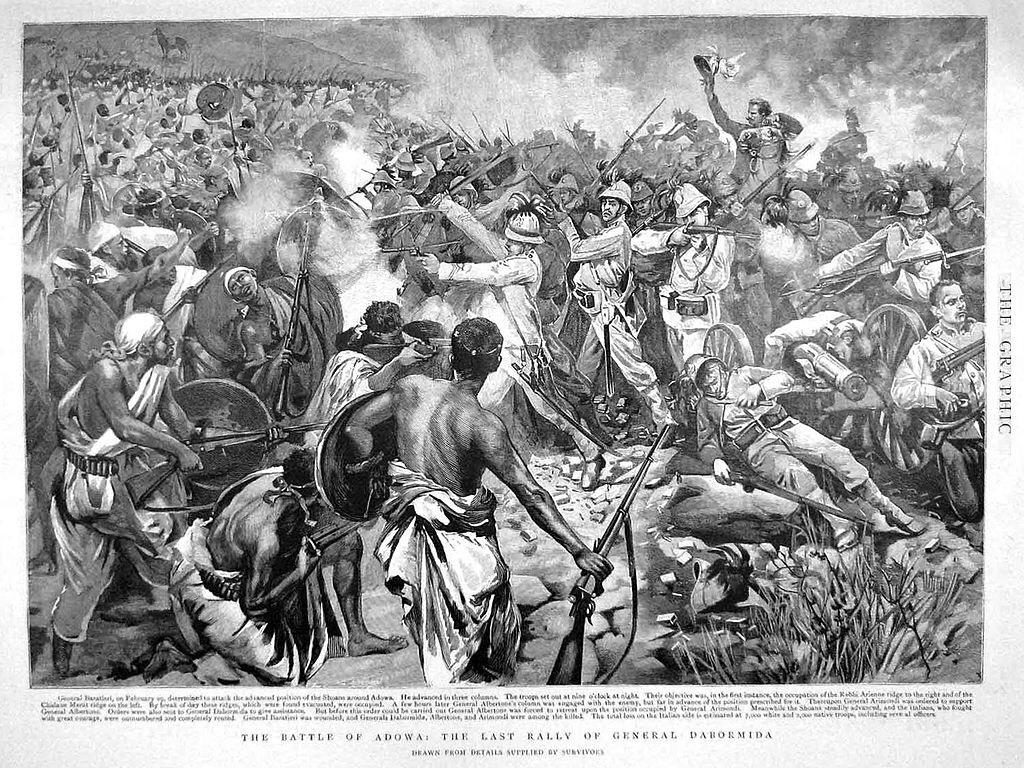
The people of Ethiopia have fought several battles and wars to preserve the dignity and the territorial integrity of their nation throughout its long history. In the 1870s and 1880s, Ethiopia successfully defeated Khedive Ismail Pasha of Egypt, who sought to bring the Nile River basin under his rule, the invading Mahdist army of Sudan and the Italians trying to turn the country into an Italian protectorate under the leadership of Emperor Yohannes IV (1837-1889).
The importance of Adwa
But the Battle of Adwa fought on 1 March 1896 holds a special place in Ethiopian History. By repelling the Italians, Ethiopia, led by Emperor Menelik II, defeated one of Europe’s major powers in an age of relentless European expansion into Africa. This victory changed the country’s destiny and transformed the consciousness of Ethiopians and people of African descent all over the world as a symbol of resistance to colonialism. Thanks to their heroic resistance, Ethiopians managed to remain the only independent African country of that time, which is why they cherish the victory of Adwa for the generations to come. As we celebrate this important part of Ethiopia’s modern history, we should also seize this opportunity to investigate many aspects of that famous chapter, and numerous revelations probably still await us as many aspects of the battle are still not well researched.

Historical Context
It is important to remind the current generation of the historical background of Adwa, the preparation for the battle, its aftermath and the various consequences of the battle, at the local, regional and international levels. In the late 19th century, the opening of Suez Canal in 1896 coupled with the Scramble for Africa by European powers increased the strategic importance of Ethiopia as several European Powers (notably France, Italy and Great Britain) sought influence in the area. Ethiopia was a country with a long history of civil war, but at the same time, it also had its share of resistance against foreign aggression. Egyptians, Sudanese, Ottoman Turks, and Portuguese had all tried and failed to dominate Ethiopia. Emperor Tewodros and Yohannes IV both died to protect the safety and security of their land and peoples.
Therefore, upon coming into power, Emperor Menelik (1844-1913) had the considerable pressure of maintaining the sovereignty and dignity of the people and the territorial integrity of the country. He had to manage internal problems while dealing with external threats at the same time. Unlike his predecessors, Emperor was ready to adopt modern inventions and lead his people by example. On the diplomatic front, he tried to foster good relations with many European powers and left his door open for negotiations and pacts. One of these pacts, made with Italy, eventually became the ‘seed of contention’ that caused of Battle of Adwa.
Treaty of Wuchale
The interpretation of the famous Treaty of Wuchale was the spark that ignited the second war between Ethiopia and Italy. In 1889, Menelik had concluded a treaty with Italy at Wuchale in Wollo province. However, there were two versions of the treaty, one in talian and another in Amharic. Unknown to Menelik the Italian version gave Italy more power than the two had agreed to. Article 17 of the Italian version stated Ethiopia’s relations with foreign countries would be determined by Italy, implying that Ethiopia was an Italian protectorate. But this was not an accurate reflection of the Amharic version which had been presented to the Emperor. Emperor Menelik II rejected the treaty as soon as he learned about the alteration. In the long history of Ethiopia, Ethiopians have never bargained nor compromised on their sovereignty, their independence and their freedom. Popular saying and proverbs of the land such as ‘No compromise on one’s wife, no compromise on one’s country!’ testify to this particular trait. However, it was not the intention of the Emperor Menelik to go to war against the Italians. Well aware of the enormous challenge the war would present, he first tried to use his diplomatic channels and skills to avoid the disaster.
The battle

The Italians first attempted to bribe Menelik with two million rounds of ammunition, but he refused. After a failed attempt to create a civil war in Ethiopia, the Italians declared war and invaded the country. As latecomers to ‘the scramble for Africa’, Italy wanted to imitate what other European powers had done. The interpretation of the Treaty of Wuchale was a good excuse for them to justify their expansion in Africa. Menelik had no choice but, to tell the truth to his people and alert them. He declared the preparation for the war. However, Italy had not anticipated the fierce resistance they would have to face to do so. Although aware they were outnumbered, Italians believed the Ethiopians to be undisciplined and unskilled at the art of war, negating the advantage in numbers. They were proven severely wrong, and by the afternoon of 1 March 1896, Italian forces were in a desperate, panicked retreat. For a country like Ethiopia, waging war against a highly superior, better trained and mechanised army at a place very distant from his capital city, required logistics efforts unprecedented in the history of the country. In consequence, the way the emperor and his allied handled the entire preparation and the battle can only be described as a masterstroke.
Historical legacy
The victory of Adwa quickly became the pride and inspiration of the subjugated people of the world and a beacon of hope for all those who resisted any form of domination of a people over others. Indeed, Adwa changed perspectives and History was never to be the same as in the pre-Adwa days for Ethiopians and of the people of African origin. What was considered unthinkable in pre-Adwa days was proved wrong. That is why Adwa is considered ‘the pride of Africa’. To commemorate this historical battle and reminds that it belongs to all people of African descent, the construction of Adwa Pan-African University was launched in January 2018. Upon completion, the university staff will carry out researches related to the battle to promote a better understand its story by all Africans.
Battle of Adwa fought on 1 March 1896, holds a special place in Ethiopian history. By repelling the Italian invaders, Ethiopia, led by Emperor Menelik II, defeated one of Europe’s major powers in an age of relentless European expansion into Africa. This article was originally published in the 10th issue (April 2018) of The Ethiopian Messenger, the quarterly magazine of the Embassy of Ethiopia in Brussels.
No comments:
Post a Comment